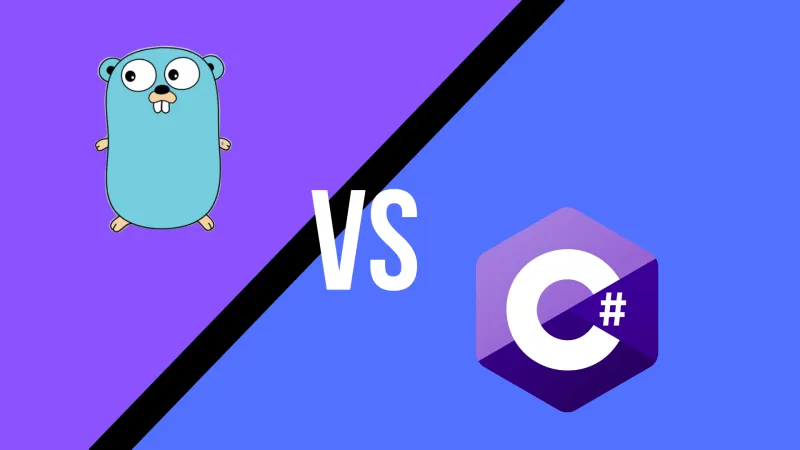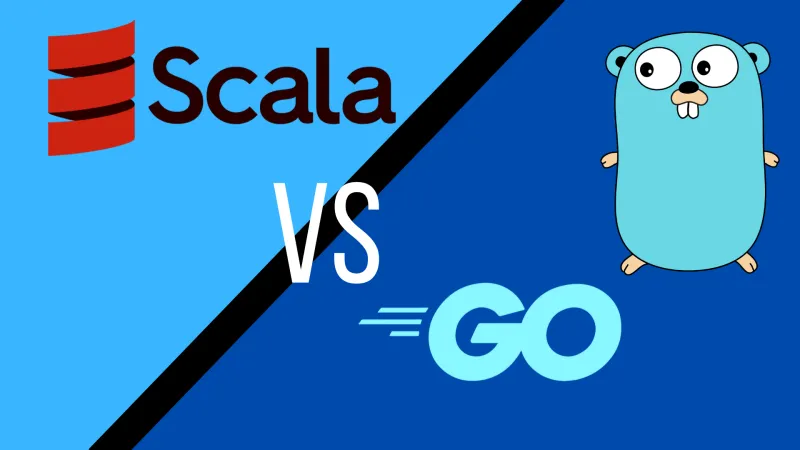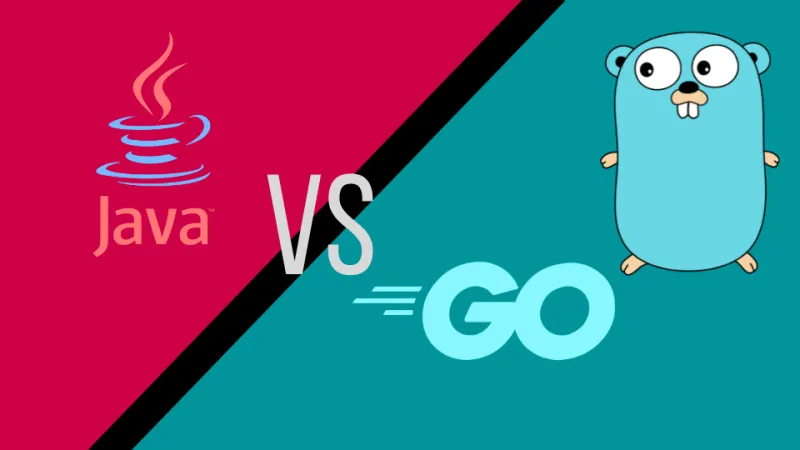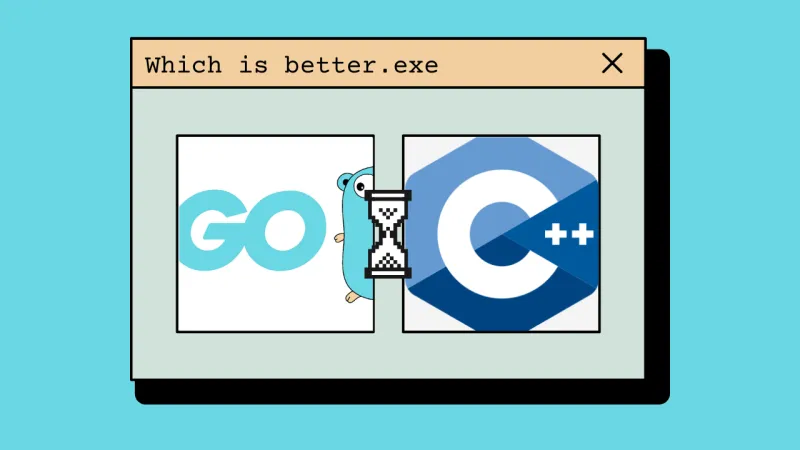Golang and C# offer a unique mixture of similarities and differences, having both been inspired by the same language, C.
Golang is a procedural, open-source, compiled programming language developed by a team at Google in 2009, after reaching their wits end with C++. The developers decided to create a language that could handle Google’s immense network servers without sacrificing readability, speed, and simplicity.
Go continues to grow in popularity and has a devoted following of programmers affectionately known as “Gophers”.
C# on the other hand is an object-oriented (OOP), general-purpose programing language that was created in 2000 as a part of Microsoft’s .NET initiative. It came about after Sun Microsystems, the original developer of Java, refused to let Microsoft edit their language, and thus C# was born.
It’s important to note that C# is supported by the .NET framework, which supports multiple languages. You can use C# without .NET, but it’s not very common. .NET is what gives C# its advantageous libraries and versatility.
If you’re interested in finding out which language best suits you, then keep reading as I compare salary, performance, job opportunities, and the advantages they pose for programmers.
Similarities between C# and Golang 🔗
Before we get our hands dirty with comparisons, there are a few important similarities to discuss.
As far as language makeup, Go and C# are both cross-platform languages with C language origins. C# is a object-oriented and C-based, so it has a very similar syntax to the C language, and the .NET framework allows it to work cross-platform, although it works best in Windows. C# is also “Microsoft’s Java”, so in a lot of ways it inherits class-based styling from Java, something Go does not do.
Golang is “C-inspired” but for all intents and purposes, it too has a similar syntax to the C language, but places a greater emphasis on readability.
Go and C# also have similar capabilities and a rich collection of base class libraries. They both support asynchronous operations, possess a compiler, powerful garbage collector, and modular programming architecture.
Go’s memory management concurrency primitives are slightly more powerful (my opinion), but both languages execute these features in a well-designed manner.
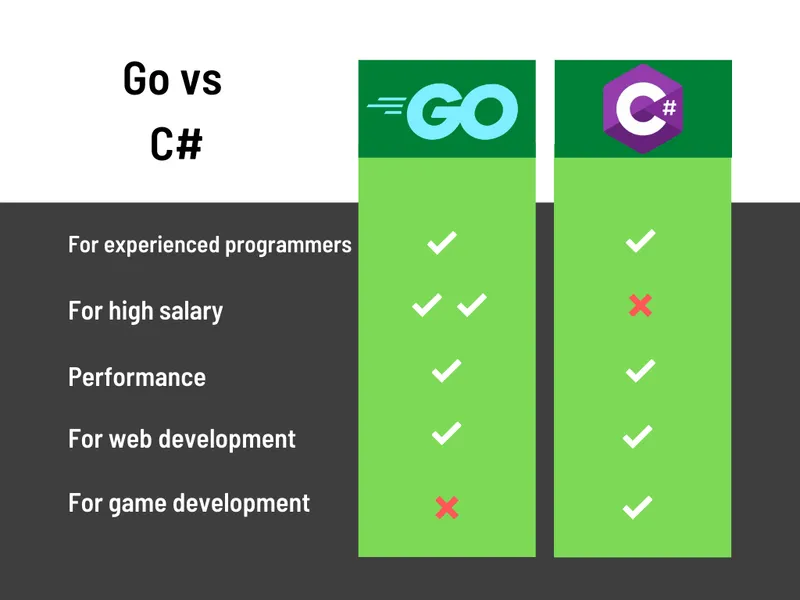
Go vs C#: Which is better for experienced programmers? 🔗
Golang and C# both offer distinct advantages for experienced programmers.
C# is ideal for experienced programmers with previous knowledge of OOP langauges like Java and Python. The syntax is similar, making learning trouble-free. However, this edge begins to falter when it comes to bigger projects. While it may be easy to pick up, there’s still an incredible amount of code to learn for advanced programs.
If you work with Windows, then C# is particularly useful as well, as it’s a Microsoft language and a popular choice for Windows desktop applications. Alternatively, C# with .NET is also an excellent choice if you plan to focus on mobile apps, game development, or backend programming. With C# you’ll be joining a large community, which is crucial for extra support and error handling.
The real focus here though is the .NET framework and the diversity of libraries and tools it brings to C#.
Golang, like C#, is easy to learn for C programmers but also for anyone else. The language is simple, so you don’t have to worry about getting bogged down by huge amounts of code. Things like team training are great because your C++ and Java programmers can pick up Go in a matter of weeks if you don’t have an experienced Go developer on hand.
Large-scale projects, network servers, or cloud services all work well with Golang’s nature. Its standard library comes ready to handle massive workloads and is even making its way into Big Data and machine learning. Since Golang is much newer than C#, it doesn’t come with the same bustling community, but it’s definitely growing.
The key difference here is that most of Go’s tools are native, while C# gets them from various frameworks and libraries. We’re not saying .NET isn’t impressive, but having optimized performance without the need for outside support encourages smoother programming.
Overall, C# is a better option if you’re working on Windows applications or game development due to it’s object oriented nature, but Go quite often pulls ahread in cross-platform work and web development.
Go vs C# Performance: Which is faster? 🔗
When it comes to performance, the best thing about these two languages is that they both perform well compared to interpreted languages like JavaScript and Python, but their strength comes in different ways.
Go’s performance excels because of how lightweight the language is. Compile-time checks, error handling, and memory management are all efficient because there’s no complex syntax features for the compiler to deal with. Go’s low resource usage and static typing also help compiling and memory management run faster and boost performance, even with concurrent operations and a garbage collector.
Go also compiles into each machine’s native binary, rather than bytecode that runs within a virtual machine like C#.
Alternatively, C#’s performance stems from the .NET framework, which powers C#’s garbage collector and error handling. C# performs exceptionally well on windows machines where it’s most optimized, buts still holds its own on Linux and Mac.
While C# is powerful, it’s still slower than Go. Why? Mostly due to C#’s heavier feature set, Go is simply more lightweight. There’s less overhead to your code in Go. Go programs tend to have smaller memory footprints, and generate fewer instructions. Go’s simple language provides certain constraints that enable additional automatic optimization, optimizations that are otherwise unlikely to be made, like escape analysis and the inlining of lambda functions.
In the end, Golang’s raw CPU speed is very similar to C#, but because of its simplistic style and native compilation, its memory usage is much lighter and Go code compiles much faster than C# code.
Go vs C#: Which has the best salary? 🔗
It’s no secret that the tech industry is a well-paying one, especially as a developer.
In the US, Golang developers on average make $140k annually and ranked number 2 on the Stack Overflow survey for highest-paid for programming language. C# developers on the other hand only make $110k annually and ranked 18 in the survey.
The same trend is seen globally, with Golang developers raking in $74k a year in spot 3, and C# developers coming in spot 12 with $57k a year.
And just to add insult to injury, Go was also ranked above C# as most loved and most wanted by developers on the same survey, so if the pay isn’t convincing enough, maybe its popularity amongst professionals is.
C# (.net) vs Go: Which is best for web development? 🔗
Both languages possess the bandwidth to work in web development, but one does it better.
C# is typically used in monolithic back-end web development, with front-end development supported by using C# to template out HTML, CSS, and JavaScript files. That said, even though C# uses .NET for most back-end web applications, you can use it for more front-end use-cases with the Blazor framework.
Because C# was created by Microsoft for Microsoft, it naturally thrives as a Windows language and works best for developing Windows desktop apps. While C# is cross-platform, it’s strongest in .NET’s native Windows environment, and fails to keep up with Go’s platform independence.
Golang, on the other hand, was built to handle one of the largest and most complex servers in the world and shines when it comes to large-scale back-end development. Go’s standard library allows you to build entire webservers without outside tools, and supports a full HTTP package, JSON, and templates.
Go’s also incredibly fast, managing its multithreading system seamlessly with static typing and a cutting-edge garbage collector. It’s not compatible with as many frameworks as C#, but you don’t really need them.
When it comes to web development, C# offers more versatility in terms of adding 3rd party tools, but as a single-thread language by default. building out a multi-threaded application can be painful.
Go vs C#: Which is best for game development? 🔗
Game development is where C#’s versatility really comes in handy.
C# is famous for its extensive use in the Unity game engine, one of the most popular game engines in the world, and the opportunities it offers those wanting to break into game development or virtual reality.
.NET is actually a part of the Microsoft Game Stack, and it alone comes with a comprehensive suite of tools and services for game development, making C# an obvious choice.
Golang can be used in game development and offers decent performance while doing so, however, it’s not widely adopted by the community and the standard library offers very limited support for game development. Anything you’d want, you’d have to create, like handle input, initialize graphics API, and hundreds of other platform-specific details. Also, not being object-oriented, developers will struggle to write game logic, OOP is a paradigm well suited for making games, which rely heavily on stateful objects.
So, while the possibility is there for Go, C# is definitely the leader in the gaming space.
Go vs C#: The final verdict 🔗
Chances are if you’re here wanting to learn a new language, it’s either because you’re looking for an easier one to use, new job opportunities, or staying on-trend, so here’s my advice to you.
C# is a superb choice If you’re a devoted Windows programmer, interested in getting into game development, or looking to scale up your company’s Windows applications.
However, Golang is a better option for those looking for enterprise-worthy back-end support a team can pick up fast, or if you’re interested in DevOps, and wider potential of future work.
All in all, these are two top-end languages that provide invaluable skills and will unquestionably level up your server-side development and résumé.
